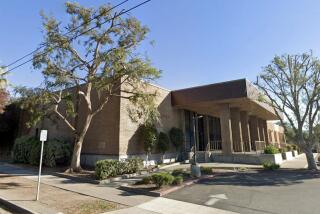Agents Tracking Fake Social Security Cards
Federal investigators hunting for potential terrorists have been poring over hundreds of fraudulent Social Security numbers generated by a Southern California ring that catered mostly to Middle Eastern immigrants.
Three people have pleaded guilty in the scheme, broken up before the Sept. 11 attacks, including a Jordanian national who worked in security at Los Angeles International Airport and a U.S. government employee who tapped a secure federal computer to procure the government-issued cards, court records and interviews show.
Over a 14-month period beginning in early 1999, about 1,000 Social Security numbers were sold to illegal immigrants and foreign nationals, authorities say.
Although it was one of the most extensive Social Security scams involving Middle Eastern immigrants uncovered in recent years, the case drew little public notice. However, within federal law enforcement circles, interest intensified immediately after the September attacks on the World Trade Center and the Pentagon.
“The reaction was, ‘Let’s find out who these people are--what ... they are doing and where they are,’” said one law enforcement official.
The FBI and other agencies declined to comment on the ongoing investigation. But law enforcement sources who requested anonymity said the wide-ranging inquiry has been expanded from an organized-crime unit to include agents chasing leads in the federal government’s anti-terrorism investigation.
“We are well into tracking all these guys down,” one official said.
The sources declined to say how many cardholders have been arrested or deported. But at least two of the names used on the cards match those of individuals indicted in Los Angeles weeks after the September attacks on charges of Social Security and immigration fraud, records show.
No links to the Sept. 11 skyjackers or to suspected terrorist groups have been found so far, officials said. But they note that a number of individuals still must be located and some have scattered to other states and beyond.
“There are a lot of numbers to track down and [some] people have left the country,” said one official.
Among the intriguing leads in the case files are several names on the fraudulent cards that, while common in the Middle East, are similar to aliases used by some of the Sept. 11 skyjackers. Confidential investigative records obtained by The Times after the East Coast attacks, for example, indicate that the skyjackers’ suspected ringleader, Mohamed Atta, used numerous variations of his name, including Mohamed Mohamed El Amir Awad.
Amir Awad was the name on one card sent to a mail drop used by the ring, records show.
The L.A.-based fraud investigation--and the broader war on terrorism--underscore gaping holes in government efforts to stop bogus Social Security cards from being issued and legitimate numbers from being misused. Most of the skyjackers had multiple identities, and although it is not clear where or how they did it, six of the skyjackers are suspected of fraudulently obtaining Social Security numbers, according to recent congressional testimony.
“It has become quickly apparent just how instrumental the use of a fraudulent [card] has been for these individuals,” James G. Huse, inspector general of the Social Security Administration, recently told a congressional panel. “[They] rely on aliases and assumed identities in order to integrate themselves anonymously into our society.”
Social Security fraud also was cited repeatedly as a reason for holding many of the hundreds of detainees rounded up in the weeks after the Sept. 11 attacks.
Theft and misuse of Social Security numbers are soaring so rapidly that it is impossible to fully gauge the scope of the problem, authorities say. One barometer, a Social Security Administration fraud hotline, has seen a fivefold jump in reports of misuse from 1998 to 2001, when it reached 65,000 calls.
One recent report to Congress warned that systems designed to stop fraud are incapable of spotting misuse that may be connected to terrorist activity.
Scheme Offered Cards With ‘Clean’ Numbers
The Los Angeles investigation was one of more than 50 nationwide in the last five years involving workers inside the Social Security agency.
The conspiracy took in nearly $800,000, prosecutors estimated, by offering one of the most valued types of fake cards--those with “clean” numbers generated by the government’s own computers. Unless such numbers are identified and flagged by authorities, there is little chance they will be detected by credit agencies, border agents or anyone else. They are often used to secure jobs by immigrants who are prohibited from working while in the U.S.
The numbers were churned out at a rate of about 15 a week and sold for roughly $800 each, records show.
Two Jordanian immigrants, Ali Nashawati and Firas Rteimeh, admitted in federal court plea agreements that they lined up customers for the cards. A third defendant, Rosa Ioane, worked in the Social Security Administration office in Downey for nearly 10 years.
Nashawati entered the country illegally in 1997, lived in Ohio for a time and later settled in Buena Park, records and interviews show. He met Ioane in early 1999 and the two began generating the illegal Social Security cards a few months later, according to Los Angeles federal court records. Ioane told investigators she married Nashawati in Las Vegas to help him gain legal residency, and he gave her cash, diamond rings and help in purchasing a home.
Rteimeh was a legal Jordanian immigrant who told federal agents he worked for an LAX security contractor from 1996 to early 2000.
Rteimeh said he met Nashawati at a downtown Los Angeles nightclub and in January 2000 began providing him with names of people who wanted to buy fake Social Security cards.
Ioane put information from Nashawati and Rteimeh into a federal government computer that ordered cards from a processing center in Baltimore. The cards were mailed to addresses across Los Angeles and Orange counties, including several apartments and post office boxes tied to Nashawati and Rteimeh, records show.
Suspicions arose in 1999 when a Social Security Administration review found multiple cards being mailed to the same addresses.
Agents also received a tip that an unidentified LAX employee with a contact inside the Downey Social Security office was selling cards. Investigators traced one of those cards to Ioane.
“The LAX connection is of great interest,” a law enforcement official said recently.
As arrests were being made in June 2000, agents searched Rteimeh’s Playa del Rey apartment and seized Social Security applications, a U.S. immigration stamp, red ink and more than $100,000 in cash, records show. Prosecutors were suspicious about the source of the money.
Rteimeh’s attorney, Ronald Richards, said the funds came from Rteimeh’s family members in the Middle East and were not proceeds from the Social Security card sales.
All three defendants pleaded guilty to conspiracy charges and in early 2001 were sentenced to 18 to 20 months in prison.
Nashawati and Rteimeh were held without bail beginning in mid-2000 and completed their sentences in December and January. Nashawati could not be reached for comment and his lawyer did not respond to interview requests. Records and interviews indicate he may have been deported.
Conspirator: Little Known About Buyers
In a brief telephone interview, Rteimeh, who is now living in the Los Angeles area, insisted he knew little about the people who purchased the Social Security cards. “They were just normal individuals” who wanted the cards, “mainly for work,” he said.
He also said he had no idea whether workers at LAX obtained any of the fraudulent cards.
Investigators have not sought his help in the search for the cardholders, Rteimeh said.
“I wish [them] the best,” he said. “The thing is over for me.... I paid my time.” He declined to answer additional questions.
Rteimeh remains here while an appeal of his sentence, which could affect future deportation hearings, is pending, attorney Richards said.
Ioane did not begin serving time until last September and remains in a Victorville prison. She declined to be interviewed, and her attorneys refused to say whether agents have sought her aid in the ongoing investigation. One lawyer, Joseph Walsh, said his client “wasn’t in a position to know [the] people” who bought the cards.
Court files shed little additional light on the card buyers, and efforts by The Times to interview purchasers have been unsuccessful. One was charged in November with buying a false Social Security card and using it to apply for a California driver’s license, court records show.
While officials concede that many cards appear to have been purchased by immigrants seeking to earn a living, they also note that multiple Social Security numbers were issued to several individuals. That could indicate the cards were being passed on to third parties trying to remain anonymous, or that the cards might be used for various types of credit fraud, law enforcement sources said.
In addition, a search of public records indicates at least some of the fraudulent cards may have been used in other states, including Florida, New Jersey and Massachusetts.
The government’s worry is that even a few cards could have fallen into the hands of people who aided the September skyjackers or are plotting future attacks.
“Obviously,” one law enforcement official said, “[we need] to make sure no terrorists are running around with ... identities that are not theirs.”
*
Times staff writers Robert J. Lopez and Patrick J. McDonnell and researchers Nona Yates, Scott Wilson and Jacquelyn Cenacveira contributed to this report.
More to Read
Sign up for Essential California
The most important California stories and recommendations in your inbox every morning.
You may occasionally receive promotional content from the Los Angeles Times.










